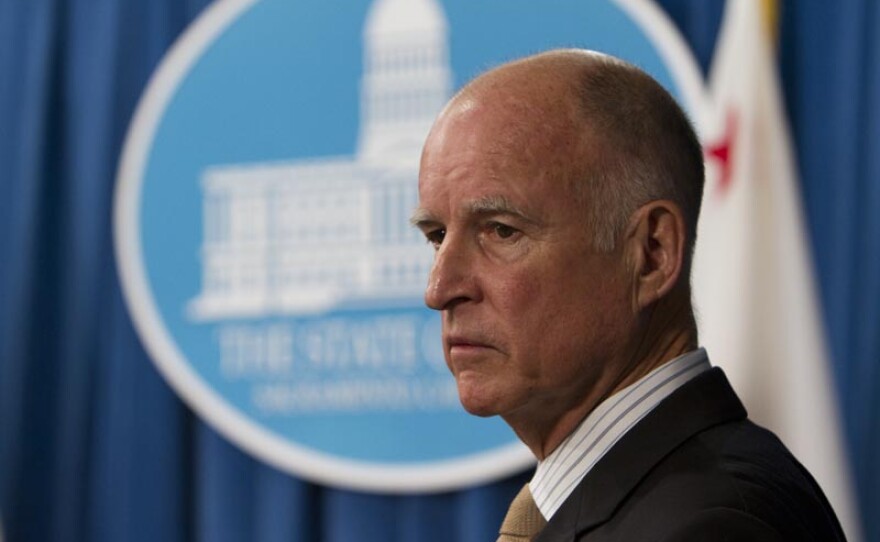Here are some of the main issues lawmakers and the governor are resolving ahead of Saturday's budget deadline:
REVENUE:
--Gov. Jerry Brown proposed a $96.4 billion state spending plan for the new fiscal year starting July 1. It maintained a $1.1 billion reserve and paid down debt. But Democrats in the Legislature sought to use a higher revenue estimate from the state's independent budget analyst. The Legislative Analyst's Office had projected California will take in $3.2 billion more in tax revenue than Brown estimated.
On Monday, the Joint Legislative Budget Conference Committee adopted the governor's more conservative revenue projection.
EDUCATION:
--Brown wants a new K-12 funding formula that would channel additional money to school districts with high levels of low-income and non-English speaking children. The formula gives more money to school districts with higher proportions of children in those groups but has met resistance from advocates for suburban and wealthier districts.
The governor agreed to a compromise that provides extra funding under a so-called concentration grant when 55 percent of a district's students are deemed economically disadvantaged. All schools would receive a higher base grant from the state, a provision meant to placate school districts that do not have high proportions of those students.
--The governor also wants to give school districts more control of how to spend state aid.
MEDICAID:
--The state has agreed to expand its Medicaid program, known as Medi-Cal, to some 1.4 million Californians under President Barack Obama's health care reforms starting next year. The federal government will pay the entire amount of the expanded coverage from 2014 to 2016, gradually reducing that to a 90 percent share.
But the governor proposed to cut local government support for Medi-Cal by $300 million in the 2013-14 fiscal year and up to $1.3 billion in 2015-16. He argued that the state would be paying twice if it did not reduce those payments -- for providing coverage under the Medicaid expansion that will be funded by the federal government while maintaining the same level of county support for indigent health care services.
County officials and health care advocates argued against the cuts because California will still have 3 million to 4 million uninsured residents requiring care after the Medicaid expansion.
Details still need to be worked out.
PROPOSITION 39
--The Legislature's budget conference committee, on a party-line vote Monday, adopted a compromise on spending of Proposition 39 energy-efficiency money approved by voters last year. Republicans said they want to see the details before deciding whether to support the plan.
It devotes $428 million to energy programs, including $380 million for schools, $48 million for community colleges and $28 million to a revolving loan program to benefit both schools and community colleges. Sen. Kevin de Leon, D-Los Angeles, who had differed with the governor over allocating the money, said recipients will have to file annual reports on how many jobs are created, how many kilowatt hours of electricity are saved and the quantity of greenhouse gasses prevented as a result of the money they receive.
OTHER ISSUES:
--Senate Democratic leader Darrell Steinberg pressed for increased mental health care funding, particularly money to expand residential treatment bed capacity. The compromise calls for providing the funding.
Steinberg also sought $131 million to restore adult dental care for 3 million Medi-Cal recipients, which would allow the poor to receive preventive dental care and dentures. The compromise would partially restore adult dental benefits at a lower level than Democratic lawmakers had wanted. It would cost the state $16.9 million this fiscal year and $77 million in the next year.
--Assembly Speaker John Perez wanted to restore welfare assistance and child care for the working poor. The compromise calls for partial funding for those programs.
--Perez also wanted to offer college scholarships for students whose families earn less than $150,000 a year, known as a middle-class scholarship. California would establish a Middle Class Scholarship program beginning in the 2014 academic year under a proposal approved by the joint budget committee on a party-line vote. At the administration's insistence, the scholarship appropriation would be capped at $305 million annually once it is fully implemented.
--Both the Senate and Assembly supported restoring some court funding. The compromise calls for restoring $63 million, not $100 million as lawmakers had sought.
Associated Press writers Judy Lin and Don Thompson contributed to this report.






